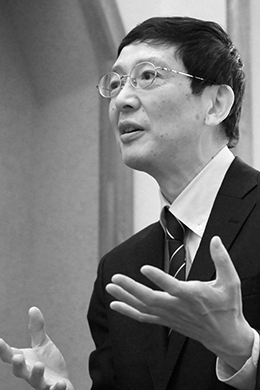
Q: Your area of specialization is International Political Economy (IPE). When did you start becoming interested in this field?
Iida: Back when I was a student, the idea of forming economic partnerships based on the Pacific Rim concept, a forerunner of today’s TPP, was just starting to appear here and there, mainly in academic societies. For my Master’s dissertation, I did a rather orthodox study tracing the evolution of this idea. Later APEC was formed, and now the TPP is coming about, so it was in a sense a pioneering idea. At the time, there were people disparaging my choice of topics, asking what sense it made to study such a nebulous idea. Looking back now, though, it seems like a rather important thing to have been doing from a future standpoint.
Q: When did economics enter into your studies?
Iida: I think it goes back to when I went to the US and encountered IPE, which was a relatively new field of study at the time. This was something that merged politics and economics. It wasn’t just a matter of someone in political science knowing a little about the economy from studying it in their spare time. There was a strong emphasis on its being a truly interdisciplinary field, so I thought this was something I really should study in earnest.
In that sense, Harvard was a terrific environment, as the same building had a political science department in one wing and an economics department in the other wing. So if you just walked over to the next hall and “violated the airspace,” you could run into the likes of economist Jeffrey Sachs. There wasn’t much of a threshold between the two, and you could easily sit in on lectures. In terms of number, I attended lots of lectures in those days. I feel I was lucky in that regard.
Q: In GSDM terms, you experienced what it is like to cross over into other areas of knowledge. Was your being in the US a big factor? Would you have had the same opportunity if you had stayed in Japan all that time?
Iida: I think it’s logical to assume I would not have. I should point out, though, if I may, that becoming a scholar was not the only thing on my mind. In fact, I had other reasons for wanting to go to the US. At the time, Japan was the second largest donor country to the United Nations, but we heard a lot about how Japan contributed only money and not people. Being just a simple youth and I felt a strong sense of responsibility about how, if that was the case, Japanese should contribute far more. I had always had a strong desire to work in an international organization and was not thinking about becoming a scholar. Not that I had given up on the idea of an academic career, but I had this really innocent notion about going out into the world and being active as a Japanese, so in fact I went to America. As it turned out, I later settled down on an academic path. I guess that’s why I’m rather interested in practical matters.
Q: In your view, how should GSDM students, especially those in the sciences, take an interdisciplinary approach encompassing science and liberal arts, including the field of International Political Economy (IPE)?
Iida: I’m not sure whether it’s my personality or just circumstance, but I have crossed over disciplines many times up to now. This has led to immense enrichment of my own field of study, while also giving me a sense of growth as a human being. The feeling of liberation was like that of a frog in a well that suddenly discovers there’s a whole wide world out there. That’s why going outside your own discipline has many different merits, not simply for your own field of study. That GSDM has built this approach into its educational program is for me something to be envied. I want GSDM students be successful for this reason.
Q: I very much agree. So much so that if GSDM had existed back when I was a student, I would have wanted to enter the program.
Iida: Absolutely. Which is why I hope students will take full advantage of the opportunities offered and achieve growth. Sitting in on the lectures of various instructors is important, but especially vital is interacting with students in different fields of study. In my Harvard days I had many contacts with others in the economics field; but when you study overseas a community of Japanese students tends to form, and there I associated with people in all kinds of fields, like sociology and archeology. All the things they talked about were completely new to me, so it was all very fresh. If possible, it would be even better if your associates included not just Japanese but people from other countries as well. That kind of interaction among different cultures is definitely a good thing that I would like to encourage strongly.
